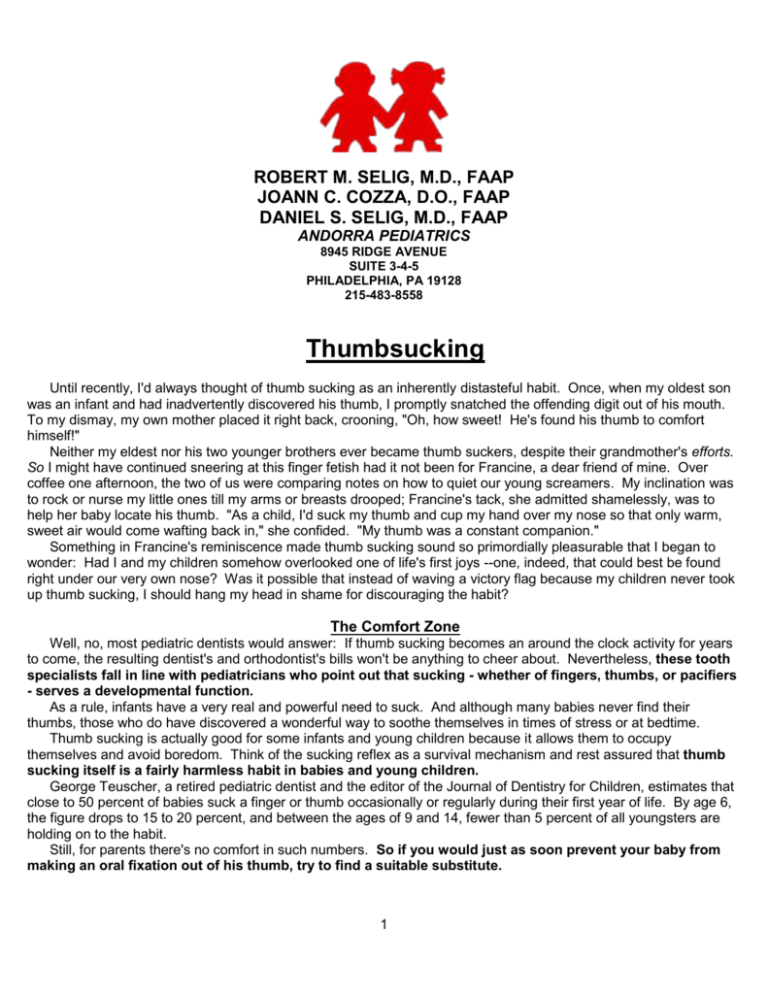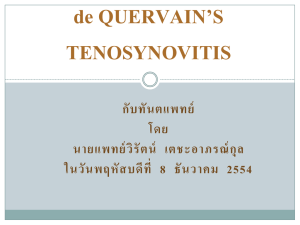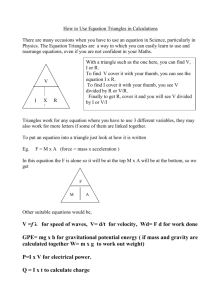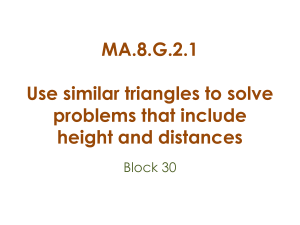Word Version - Andorra Pediatrics
advertisement

ROBERT M. SELIG, M.D., FAAP JOANN C. COZZA, D.O., FAAP DANIEL S. SELIG, M.D., FAAP ANDORRA PEDIATRICS 8945 RIDGE AVENUE SUITE 3-4-5 PHILADELPHIA, PA 19128 215-483-8558 Thumbsucking Until recently, I'd always thought of thumb sucking as an inherently distasteful habit. Once, when my oldest son was an infant and had inadvertently discovered his thumb, I promptly snatched the offending digit out of his mouth. To my dismay, my own mother placed it right back, crooning, "Oh, how sweet! He's found his thumb to comfort himself!" Neither my eldest nor his two younger brothers ever became thumb suckers, despite their grandmother's efforts. So I might have continued sneering at this finger fetish had it not been for Francine, a dear friend of mine. Over coffee one afternoon, the two of us were comparing notes on how to quiet our young screamers. My inclination was to rock or nurse my little ones till my arms or breasts drooped; Francine's tack, she admitted shamelessly, was to help her baby locate his thumb. "As a child, I'd suck my thumb and cup my hand over my nose so that only warm, sweet air would come wafting back in," she confided. "My thumb was a constant companion." Something in Francine's reminiscence made thumb sucking sound so primordially pleasurable that I began to wonder: Had I and my children somehow overlooked one of life's first joys --one, indeed, that could best be found right under our very own nose? Was it possible that instead of waving a victory flag because my children never took up thumb sucking, I should hang my head in shame for discouraging the habit? The Comfort Zone Well, no, most pediatric dentists would answer: If thumb sucking becomes an around the clock activity for years to come, the resulting dentist's and orthodontist's bills won't be anything to cheer about. Nevertheless, these tooth specialists fall in line with pediatricians who point out that sucking - whether of fingers, thumbs, or pacifiers - serves a developmental function. As a rule, infants have a very real and powerful need to suck. And although many babies never find their thumbs, those who do have discovered a wonderful way to soothe themselves in times of stress or at bedtime. Thumb sucking is actually good for some infants and young children because it allows them to occupy themselves and avoid boredom. Think of the sucking reflex as a survival mechanism and rest assured that thumb sucking itself is a fairly harmless habit in babies and young children. George Teuscher, a retired pediatric dentist and the editor of the Journal of Dentistry for Children, estimates that close to 50 percent of babies suck a finger or thumb occasionally or regularly during their first year of life. By age 6, the figure drops to 15 to 20 percent, and between the ages of 9 and 14, fewer than 5 percent of all youngsters are holding on to the habit. Still, for parents there's no comfort in such numbers. So if you would just as soon prevent your baby from making an oral fixation out of his thumb, try to find a suitable substitute. 1 Plastic Alternatives Pacifiers are the obvious proxy for thumbs; parents who approve of these plastic plugs should let their children get acquainted with them during the first months of life. before they have a chance to team up with their thumbs. Once a child is already addicted to his thumb, though, he probably cannot be enticed to use a pacifier. "Years ago, I tried to persuade my own kids to use pacifiers instead of their thumbs;" recalls Dr. Edward Christophersen, chief of behavioral pediatrics at Children's Mercy Hospital in Kansas City, Missouri. "But they just got fat tongues pushing them back out!" Although many children do not develop a taste for pacifiers, dental specialists believe that they are less problematic than thumbs. For starters, pacifier enthusiasts do not engage in their habit as often as thumb suckers do, and they rarely develop the waterlogged skin that can afflict their thumb loving peers. Also, kids are likely to give up these devices earlier and more readily than thumb suckers are to withdraw the thumb. When it's time to set aside those sucking ways, for instance, parents can always "lose" or "forget" the pacifier. Out of sight, out of mind. A thumb, on the other hand, is always at your child’s beck and call. Despite these qualified endorsements of pacifiers over thumbs, parents won't want to push plastic on their little one too often: "Parents sometimes use pacifiers inappropriately--at times when cuddling, feeding, or talking to the child should have been the first choice," says Hogan. "Instead of automatically offering a pacifier, use it sparingly, such as after the baby has finished a good meal and still seems interested in sucking." When Thumbs Turn Sour But whether a child has a finger fetish or a yen for pacifiers, the time may come when parents will need to convince him to leave this oral habit behind. "Ideally, kids should stop both thumb and pacifier sucking by age four," says Dr. R. Glenn Rosivack, a pediatric dentist and clinical assistant professor at the University of Medicine and Dentistry of New Jersey in Newark. "Certainly by age six at the very latest," he adds. Otherwise, all the perks of this once enjoyable activity may be overshadowed by a host of physical and social problems: Three Bad Bites: Nearly everyone knows that the constant pressure of a thumb in the mouth may cause the front teeth to protrude, forming what's commonly called buckteeth. But persistent thumb suckers may also develop what's known as an open bite, characterized by a gap between the top and bottom incisors so wide that small objects, such as a tongue, a toothbrush, or a thumb, can pass right through them even when the teeth are clenched. Continuous and vigorous sucking also creates what's called a cross bite, which narrows the roof of the mouth and inhibits the growth of the upper jaw. These misalignment problems don't merely look bad; they can cause speech problems, such as lisping, and require orthodontic treatment to reverse. Skin and Bone: Teeth are not the only potential problem areas for thumb suckers. The skin on those constantly immersed thumbs is quite prone to chapping and cracking. However, applying petroleum jelly or antibiotic gel and a bandage for several days may help clear up the skin. A less common side effect of thumb sucking is a finger infection known as paronychia. If a child's finger shows signs of redness, tenderness, or pus, or has a pimple at the junction of the cuticle and fingernail, this indicates an infection and requires treatment. Finally, truly severe sucking can lead to a bone deformation, causing the thumb to bend sideways at the first joint. This condition, too, is rare, but when it occurs, the thumb may need to be surgically realigned. Taunts and Tension: After a young thumb sucker reaches a certain age, many of his peers are likely to take a dim view of his habit. In research conducted by child psychologist Friman, first-graders who were shown a picture of a child sucking his thumb after seeing a photo of the same child earlier without his thumb in sight, rated the thumb sucker least desirable as a playmate, and described him as "ugly and stupid." So find out whether your thumb-sucking youngster is being teased by his friends. If he is, that peer pressure, along with your constant support, may provide just the motivation he needs to stop. Although this habit is rarely related to any deep-seated psychological problems, be on the alert for other unusual signs, just in case. "Children who seem to prefer sucking to interacting with others may need professional help," says Friman; ditto for those kids whose thumb fetish is accompanied by more serious tendencies such as hair pulling or whose habit becomes a source of tension within the family. Going Cold Turkey To help wean a youngster from his thumb, parents can choose one of several approaches, depending on the child's willingness. First you might try some behavioral therapy. If persistent and gentle persuasion on the home 2 front is not working after several months, you can have a dentist fit an in-mouth retainer designed to make thumb sucking uncomfortable, or you can seek the help of a child psychologist who will work with the family to establish a treatment plan. Parents interested in this avenue need not fret about long term Freudian analysis. "A thumb sucker can usually be persuaded to quit in about one to three motivational sessions," says Friman. In some cases, however, ignoring the problem completely is the best therapy. Instead of threatening and cajoling--which often turns the habit into a way of getting attention--simply inform your youngster that although you wish he would stop, it's up to him. Then relax and be patient. (Kathryn E. Livingston is a contributing editor) Below, experts reveal their secrets to help a child 4 years of age or older kick the thumb-inmouth habit: Pick a relatively quiet time in your child's life to try to get him to stop--not when your family is in turmoil or when a new baby has arrived. Tell your child why thumb sucking may cause trouble down the road; if he resists the idea of quitting, wait until he is ready. Each day your child avoids putting his thumb in his mouth, place a star on the calendar and offer a small, preferably immediate, reward or privilege. (Dr. Tsamtsouris, pediatric dentist, MA) Many children simply need to be made more aware of their habit in order to quit it. So try to catch your child when he is not sucking his thumb and praise him. But when you do see him sucking, simply ask, "Do you know where your hand is now?" Next, train your child to substitute for his sucking by encouraging him to switch to some other use of his hands such as grasping a toy, holding a book, writing, checking his pockets, getting a drink of water - anything that's incompatible with keeping his thumb in his mouth. Or, teach him how to clench his thumb in his fist each time he finds himself sucking. (Nathan Azrin, behavioral therapist, Fort Lauderdale, Florida) If you have already been unsuccessful at getting your youngster to quit, I recommend declaring a one month moratorium on the matter. During this time--unless some obvious medical problems exist--let your child suck to his heart's content. This should defuse the tension surrounding the problem. After a month, set up a reward system. If a child under seven goes a day without sucking his thumb, offer an immediate prize--such as stickers or a treat. For an older child, create a dot-to-dot drawing of a special reward; each day he goes without indulging in his habit, he can connect a pair of dots. When all the dots are connected, he collects his prize. (Patrick C. Friman, child psychologist, Nebraska) I advise parents to prepare for a thumb sucking treatment with therapeutic touching: Make it a point to touch your child briefly about a hundred times a day, in order to create a supportive atmosphere before the treatment begins. After two weeks, continue with your affectionate touching, but start using Stopzit (a bad tasting substance manufactured specifically to discourage oral habits). Paint the thumb or finger up to the second joint, and repaint each time your child tries to suck. (Dr. Edward Christophersen, pediatrician, Kansas City, MO) To stop a thumb sucking habit, you will have to avoid making it a big issue in the family. Wait until your child has reached the age of reason, between four and six, and find out if he really wants your help to quit. Show him how the skin on his thumb has already changed and how his teeth have been affected as a result of his habit. Once he is motivated to quit, buy a box of colorful bandages and stick them on as a reminder. Encourage him to continue to put one on by himself every morning. At night, see if he will wear a colorful glove or mitten to prevent unconscious sucking. And remember, every step you take has to be made with the child's permission. (Dr. Barton D. Schmitt, pediatrician, Denver, Colorado) Teach your child to wash his hands before eating. Explain to your child that only food should be put into his mouth. Each and every time he wants to put his fingers into his mouth, he must first wash his hands. Directing his attention to hand washing whenever his fingers approach his mouth may eventually help break this habit. (Robert M. Selig, M. D. FAAP, pediatrician, Philadelphia, PA) 3





![Measuring Reaction Times (modified) [word document]](http://s3.studylib.net/store/data/005890593_1-f3403f0a4fee937a93ebd23d2df416ab-300x300.png)
